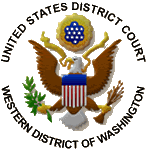| Microsoft v. United States | |
|---|---|
 | |
| Court | United States District Court for the Western District of Washington |
| Full case name | Microsoft Corporation v. The United States Department of Justice, and Loretta Lynch, in her official capacity as Attorney General of the United States |
| Defendants | United States Department of Justice, Loretta Lynch |
| Plaintiff | Microsoft |
| Keywords | |
| Search warrant, electronic surveillance | |
Microsoft Corporation v. United States of America was a complaint for declaratory judgment action filed in the U.S. District Court in Seattle, Washington.[1] At issue was the 1986 Electronic Communications Privacy Act.[2][3] with Microsoft arguing that secrecy orders were preventing them from disclosing warrants to customers in violation of the company's and customers' rights.[4][2] The case was started in April 2016[2] and although the government bid for dismissal of the suit,[3] in February 2017 a federal judge set a trial date set for June 2018.[5] Microsoft was supported in its lawsuit by companies such as Amazon, Apple, Google,[6] Dropbox and Salesforce.[5] The case was dropped by Microsoft in October 2017 after policy changes at the Department of Justice.[7][3][6][5][8][9] Although no laws were changed,[3] the new DOJ policy "changed data request rules on alerting Internet users about agencies accessing their information," and mandated defined periods of time for secrecy orders from the government.[4] Although the change represented "most of what Microsoft was asking for,"[9] Microsoft did not rule out future litigation.[3]
- ^ Complaint for Declaratory Judgment, Microsoft Corporation v. United States Department of Justice et al, Case No. 2:16-cv-00538 (filed 2014-04-14, W.D. Wash.).
- ^ a b c "Microsoft sues government for secret searches", CNN, Jose Pagliery, April 14, 2016
- ^ a b c d e "U.S. Will Curb ‘Sneak-and-Peek’ Searches Microsoft Sued Over", Bloomberg, Dina Bass and Chris Strohm, October 23, 2017
- ^ a b Cite error: The named reference
VBwas invoked but never defined (see the help page). - ^ a b c "DOJ changes “gag order” policy, Microsoft to drop lawsuit", ArsTechnica, Cyrus Farivar, October 24, 2017
- ^ a b "Microsoft drops its lawsuit over gag orders on DoJ searches", Engadget, Richard Lawler, October 24, 2017
- ^ "Microsoft to drop lawsuit after U.S. government revises data request rules", Reuters, October 23, 2017
- ^ "US DoJ eases gagging rules, Microsoft drops data slurp alert lawsuit", The Register, Rebecca Hill, October 24, 2017
- ^ a b "Microsoft Drops Lawsuit As DoJ Reins In Use Of Gagging Orders", Forbes, Emma Woollacott, October 24, 2017